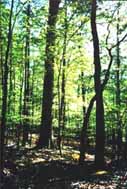Bush administration agrees to protect forests from logging in three U.S. states
The Bush administration Wednesday approved requests from three state governors to bar commercial logging in remote sections of national forests in their states.

The petitions from Virginia, North Carolina and South Carolina, covering a total of 555,000 acres (222,000 hectares), were the first ones submitted to the administration since it eased logging restrictions on what are known as roadless tracts.
U.S. Agriculture Undersecretary Mark Rey said from Washington that he hoped the acceptance would show governors around the country, including four in the West who have sued to block such logging, that the administration is willing to work with them.
"We've always been green," Rey said. "We just haven't gotten credit for it."
The petitions still must go through a public review that could take years before the protections are in place.
The three governors asked to return roadless areas in their states to the protections that existed under 2001 rules initiated by the Clinton administration.
"The approval of our request to keep these areas roadless, along with our ongoing efforts to protect other ecologically significant land in the state is an important step toward preserving the way we look and feel as a state and preserve our competitive advantage with respect to our quality of life," South Carolina Gov. Mark Sanford said in a statement.
Mike Anderson of the Wilderness Society said that there is little pressure in those three states to log in national forests, making the decision an easy one for the Bush administration.
A federal judge in Oregon was expected to rule Wednesday on a bid by conservationists to block logging in a burned-over, roadless area in the Rogue River-Siskiyou National Forest. Earlier this month, the government auctioned off the rights to cut dead timber there for more than $300,000 (Ђ237,492).
It was the first such sale since the Bush administration eased the Clinton-era restrictions. Environmentalists warned that the sale could open the door to logging on nearly 60 million acres (24 million hectares) of national forest.
Rey said the Oregon sale was intended to speed recovery of the forest after a 2002 fire. He added that the logs would be removed with helicopters, and no roads would be built.
Pressure has been growing from the timber industry to open roadless areas to logging, because they represent the last big source of untouched old-growth timber in the country, particularly in the West. Oregon, California, Washington, and New Mexico have joined in a lawsuit to stop roadless logging, reports AP.
O.Ch.
Subscribe to Pravda.Ru Telegram channel, Facebook, RSS!




